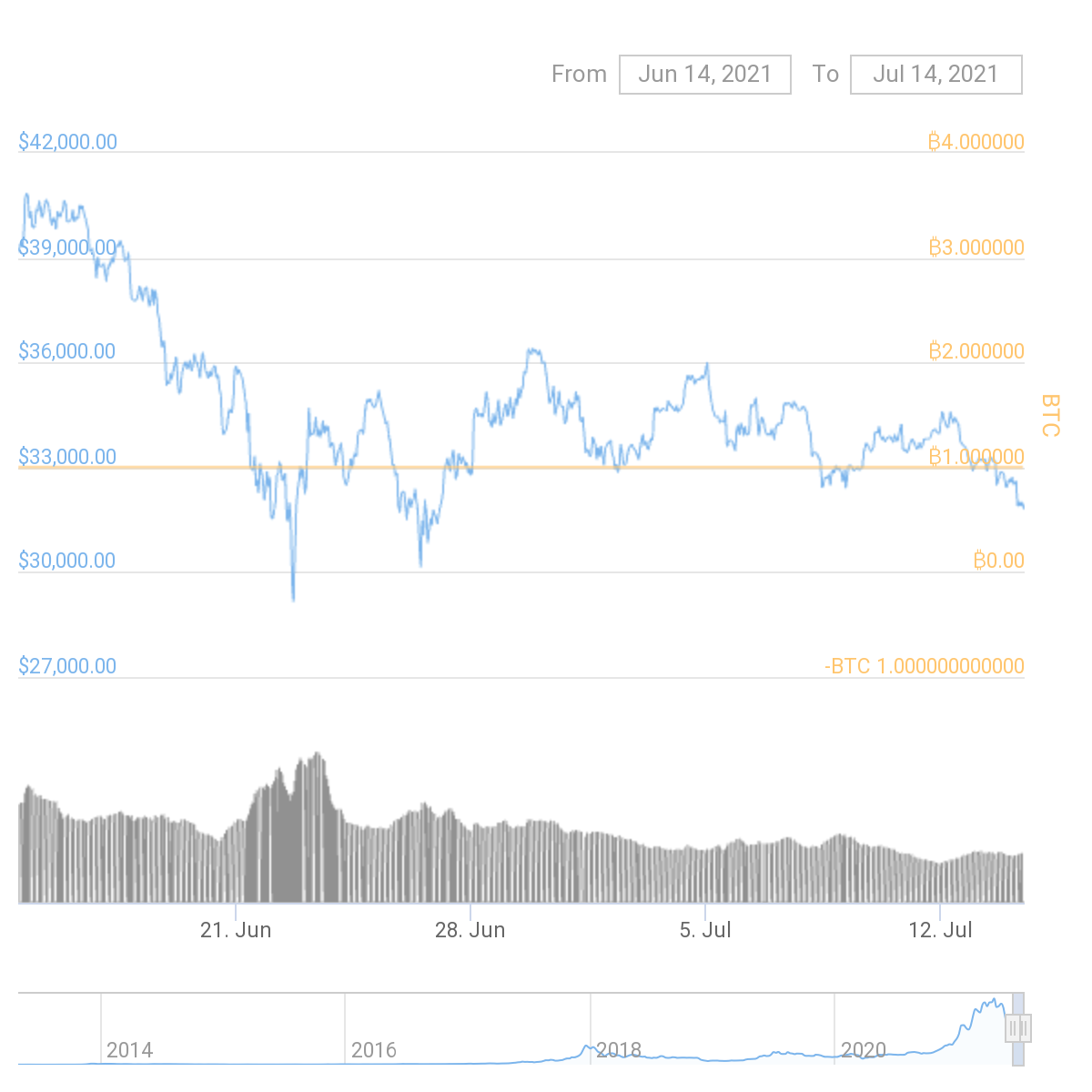Bitcoin (BTC), Alts Slide on Weakened Sentiment

#
On Wednesday, the overall market sentiment saw most crypto assets slide from their relatively stable positions in the past weeks. Bitcoin (BTC) returned below $32,000, while Ethereum (ETH) crashed to the $1,800 range after holding near $2,200 for weeks.
BTC traded at $31,824.21 on volumes around $20B in the past day. BTC is losing some of the support of Tether (USDT), which has not issued new coins in months. In the past month, about 640M USDT seem to be retired from circulation.
The slide happens at a time when markets are seeking direction, and may cause repercussions in an increasingly connected ecosystem of DeFi lending and liquidity pools.
What Causes the Market Weakness
One of the reasons for the current weakness is the stagnation in BTC prices, where the leading coin established itself between $30,000 and $35,000. BTC could not regain levels above $40,000 for any significant period.
The most pessimistic assessment comes from the noticeable fact that enthusiasm from new buyers has waned as most assets do not look like breaking into new price records.
BTC trading has indeed stalled to about $20B in 24 hours, where usually volumes could easily reach 60B per day.
Current prices remain close to, or below the levels where Microstrategy and Tesla, Inc. bought into BTC.
Fear Dominates the Market
Trading activity for BTC measures a fearful mood, where the Crypto fear and greed index has already spent weeks in the “fear” or “extreme fear” range.
The measurement of fear is not a guarantee for a movement in either direction. For some, it is a sign that BTC may slide to a lower range. For others, there is a possibility to buy before a new shift to greed.
BTC sentiment is highly dependent on the futures markets. Since the initial crash in May, which pushed prices below $50,000, BTC futures trading has been subdued. Open interest for all futures markets crashed and has not recovered to the levels that sparked the bull market in 2021.
Glassnode data show negative funding rates for the futures markets, underlining the very low interest in derivatives.
BTC futures trading is extremely volatile, and record liquidations in May have made traders extremely cautious. Even at the current lower futures trading, BTC prices can trigger liquidations, potentially giving way to a new price range. Futures positions suggest BTC may return to $34,000, liquidating some of the short positions.
One saving grace for BTC is that the spot market remains robust, with significant interest in buying and taking coins off exchanges. An estimated 2,000 BTC are taken off exchanges, recent Glassnode analysis shows.
Mining is also re-established, as Bitcoin hashrate grows above 107 EH/s once again, up about 20% from the recent lows. Glassnode data also show that miners are once again holding onto their coins in a new accumulation stage.
The big question for BTC remains on whether its current price action is similar to March 2020. Some analysts view the current price stagnation as a sign of accumulation. For others, more capitulations may be observed before new attempts at price growth.
BTC Gets Boost from Taproot Acceptance
The Bitcoin Taproot upgrade is moving toward adoption, with the potential to allow anonymous transactions on the main network. In the past few weeks, most node operators signalled readiness to implement the upgrade, with a completion date set in November 2021.
The Taproot adoption grew in the past days, from about 27% upgrades to the current level close to 30%. More than 90% are required for the upgrade to become official.
Can ETH Save the Day
ETH prices are essential to the stability and growth of DeFi tokens, decentralized trading and lending platforms.
ETH recently touched $2,300, but went on to unravel to $1,890.39. The asset lost more than 20% in the past week, as the loss accelerated in the last 24 hours. ETH got a boost from news surrounding the London upgrade, but that support was temporary. The implementation of EIP-1559, or the London hard fork, is scheduled to happen around August 4.
However, ETH is not decoupled from the general market sentiment and BTC prices. The rise in DeFi token prices is also temporary, as the market downturn affected even the most recent gainers.
Uniswap (UNI), the native token of the leading decentralized exchange, shed more than 12% overnight to $17.13. The token also saw selling pressure after the Uniswap-funded DeFi Education Fund announced it would liquidate UNI worth $10M.
Previous strong gainer Aave (AAVE) is also down about 15% to the $260 range. Overall, the price of DeFi tokens slid by about 7%, as the collection of assets lost about $10B from its market capitalization, down to $72B.

With over 50 coins and an obsession with security, Kraken is one of the safest places to buy and trade crypto.

Kraken has a good reputation for security and protection of your funds and operates across the USA (except NY), Canada, the EU and Japan

Crypto gets a lot of criticism sometimes but what sort of job are the current banks doing at looking after their customers. Who are the best and the worst banks to be with?

Is mining crypto still profitable? With more cryptos like Ether switching to POS is the competition going to get too much?

The leader in programmable money, smart contracts and decentralised applications. There have been many copycats but none have the community and level of adoption.

An innovative digital asset utilizing a fully decentralized consensus protocol called Ourobouros. The network aims to compete with Ethereum in offering smart contract functionalities. However it is lightyears behind Ethereum in terms of adoption.